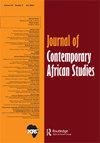Playing for oman Ghana: Women’s Football and Gendered Nationalism
IF 0.8
Q2 AREA STUDIES
引用次数: 1
Abstract
Feminist scholars of nationalisms acknowledge the gendered character of national identity. Due to their association with heterosexual masculinity, national sports teams are one avenue through which gendered nationalisms manifest. Football (soccer) represents the peak of sporting masculinity and national identity around the world. Following the inaugural Women’s World Cup in 1991, women’s football continues to gain global popularity, raising questions about what new forms of nationalism can take root through this sport. Recent transnational feminist research has highlighted how, despite feminist resistance, patriarchal forms of gendered nationalism persist. Using the case of Ghanaian women’s football, I examine how reactions to the national team shape and reveal understandings of gender and national identity. I find that whilst state institutions use their support of the women’s team to shore up heteropatriarchal national identity, some spectators and fans discursively advocate for a recognition of women footballers as citizens and workers. These findings have implications for how activists and scholars engage the gendered construction of national identity.为阿曼加纳踢球:女足和性别民族主义
研究民族主义的女性主义学者承认民族认同的性别特征。由于与异性恋男子气概的联系,国家运动队是性别民族主义表现的一个途径。足球在世界范围内代表着体育男子气概和民族认同的顶峰。在1991年首届女足世界杯之后,女足继续在全球范围内受到欢迎,这引发了人们对什么样的新形式的民族主义可以通过这项运动扎根的质疑。最近的跨国女权主义研究强调,尽管女权主义者的抵制,男权形式的性别民族主义仍然存在。以加纳女足为例,我研究了对国家队的反应如何塑造和揭示了对性别和国家认同的理解。我发现,虽然国家机构利用他们对女足的支持来巩固男权国家的身份认同,但一些观众和球迷却在口头上主张承认女足运动员是公民和工人。这些发现对活动家和学者如何参与国家认同的性别建构具有启示意义。
本文章由计算机程序翻译,如有差异,请以英文原文为准。
求助全文
约1分钟内获得全文
求助全文
来源期刊

Journal of Contemporary African Studies
AREA STUDIES-
CiteScore
2.20
自引率
0.00%
发文量
18
期刊介绍:
Journal of Contemporary African Studies (JCAS) is an interdisciplinary journal seeking to promote an African-centred scholarly understanding of societies on the continent and their location within the global political economy. Its scope extends across a wide range of social science and humanities disciplines with topics covered including, but not limited to, culture, development, education, environmental questions, gender, government, labour, land, leadership, political economy politics, social movements, sociology of knowledge and welfare. JCAS welcomes contributions reviewing general trends in the academic literature with a specific focus on debates and developments in Africa as part of a broader aim of contributing towards the development of viable communities of African scholarship. The journal publishes original research articles, book reviews, notes from the field, debates, research reports and occasional review essays. It also publishes special issues and welcomes proposals for new topics. JCAS is published four times a year, in January, April, July and October.
 求助内容:
求助内容: 应助结果提醒方式:
应助结果提醒方式:


